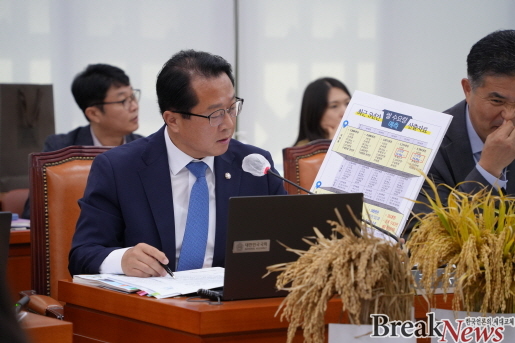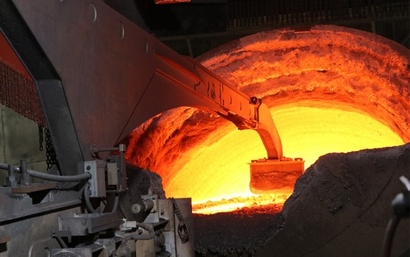
(브레이크뉴스 광주·전남) 이학수 기자=올해 가루쌀 수발아 피해가 전체 재배면적의 23%에 달했다. 미도복 상태(쓰러지지 않은 벼)의 가루쌀 수발아 피해율도 11%로 전년도 일반벼 수발아 피해율이 0.2%에 불과한 것에 비하면 무척 높은 수치이다.
국회 농림축산식품해양수산위원회 소속 더불어민주당 문금주 의원(전남 고흥·보성·장흥·강진)이 11일 농해수위 국정감사에서 “정부가 양곡관리법을 반대하며 대책으로 내놓은 가루쌀 생산확대 정책 추진에 앞서 농진청이 가루쌀 품종이 수발아 피해에 취약한 문제가 있음을 사전에 인지했을 가능성이 높았음에도 무리하게 농가에 보급해 피해를 키웠다”고 지적했다.
2023년부터 농진청이 수행하고 있는 연구과제인 ‘가루쌀(바로미2)의 재배적 단점 개선 기술개발’ 연차보고서에는 2018~2019년까지 수발아 피해에 대해 농진청이 선행연구를 진행했는데 가루쌀 보급종인 바로미2의 수발아율이 크게 높았음을 기술하고 있었다.
또한, 2024년 농림부와 농진청이 발간한 ‘가루쌀 바로미2 안정재배기술 설명자료집’에도 농진청은 여뭄기의 기온이 증가할수록 가루쌀의 수발아율이 급격히 증가한다고 설명하고 있어 이미 문제점을 알고 있었던 것으로 의심된다.
문 의원은 “농진청이 가루쌀 품종이 수발아 피해에 취약하다는 사실을 미리 알고 있음에도 정부가 정책으로 밀어붙이니 한마디도 못하고 농가에 보급했을 가능성이 높다”며 “그런 무책임한 태도로 인해 결국 피해는 가루쌀 재배 농가가 보고있다”고 질책했다.
더 큰 문제는 2023년 농진청이 문제의 가루쌀 품종을 농가에 보급한 후 가루쌀(바로미2)의 재배적 단점 개선 기술개발에 뒤늦게 착수한 것이다. 농가 보급전에 문제점을 분석해 개선된 품종을 보급했어야 한다.
문 의원은 “문제가 있는 부분이 있으면 이를 명확히 알려야 할 의무가 있음에도 이를 숨긴 것과 아무것도 모르고 정부의 정책에 맞춰 가루쌀을 재배하고 있는 농민들이 피해를 보고 있다는 점에 있어 이는 명백한 농진청의 직무 유기다”고 말하며 “더 많은 피해가 발생하기 전에 문제의 가루쌀 품종 보급을 즉각 중단하고 농민들 피해에 대해 농진청이 책임을 져야한다”고 강력히 주장했다.
아래는 위 기사를 '구글 번역'으로 번역한 영문 기사의 [전문] 입니다. '구글번역'은 이해도를 높이기를 위해 노력하고 있습니다. 영문 번역에 오류가 있을 수 있음을 전제로 합니다. The following is [the full text] of the English article translated by 'Google Translate'. 'Google Translate' is working hard to improve understanding. It is assumed that there may be errors in the English translation.
[National Assembly Inspection] Rep. Moon Geum-ju, “It is highly likely that the Rural Development Administration was aware of the vulnerability of germination damage in powdered rice distributed to farmers in advance”
This year, the germination damage of powdered rice reached 23% of the total area… Rep. Moon, “We must immediately stop distributing powdered rice varieties with high germination damage to farmers”
(Break News Gwangju·Jeonnam) Reporter Lee Hak-su = This year, the germination damage of powdered rice reached 23% of the total cultivated area. The germination damage rate of powdered rice in the unripened state (rice that has not fallen over) was 11%, which is a very high figure compared to the germination damage rate of general rice last year, which was only 0.2%.
On the 11th, Democratic Party of Korea lawmaker Moon Geum-ju (Jeonnam Goheung, Boseong, Jangheung, Gangjin) of the National Assembly Agriculture, Food, Rural Affairs, Oceans and Fisheries Committee pointed out during the National Assembly audit of the Agriculture, Forestry and Fisheries Committee that “the government opposed the Grain Management Act and put forth a policy to expand powdered rice production as a countermeasure, and it was highly likely that the Rural Development Administration was aware in advance that powdered rice varieties were vulnerable to germination damage, but they forced the distribution to farmers and increased the damage.”
The annual report on ‘Development of Technology to Improve Cultivational Disadvantages of Powdered Rice (Baromi 2)’, a research project that the Rural Development Administration has been conducting since 2023, states that the Rural Development Administration conducted a preliminary study on germination damage from 2018 to 2019, and that the germination rate of Baromi 2, a powdered rice variety, was significantly high.
In addition, in the ‘Powdered Rice Baromi2 Stable Cultivation Technology Explanation Data Collection’ published by the Ministry of Agriculture, Food and Rural Affairs and the Rural Development Administration in 2024, the Rural Development Administration explained that the germination rate of powdered rice increases rapidly as the temperature in the summer season increases, so it is suspected that they were already aware of the problem.
Rep. Moon criticized, “It is highly likely that the Rural Development Administration knew in advance that powdered rice varieties were vulnerable to germination damage, but did not say a word because the government pushed it forward as a policy, and distributed it to farmers.” He added, “Due to such an irresponsible attitude, the farmers who grow powdered rice are ultimately suffering the damage.”
The bigger problem is that the Rural Development Administration belatedly began developing technology to improve the cultivation shortcomings of powdered rice (Baromi2) after distributing the problematic powdered rice variety to farmers in 2023. They should have analyzed the problems and distributed improved varieties before distributing them to farmers.
Rep. Moon said, “It is clear that the Rural Development Administration is dereliction of duty in that they hid the problem despite having a duty to make it clear if there was a problem, and farmers who are cultivating powdered rice in accordance with government policy without knowing anything are suffering damages.” He strongly argued, “Before more damage occurs, the distribution of the problematic powdered rice variety must be stopped immediately, and the Rural Development Administration must take responsibility for the damages to farmers.”




![[업무보고] 식약처장 "GMO 완전표시제 법안 통과…내년 12월 시행"](https://img.newspim.com/news/2024/07/24/240724113615917_w.jpg)
